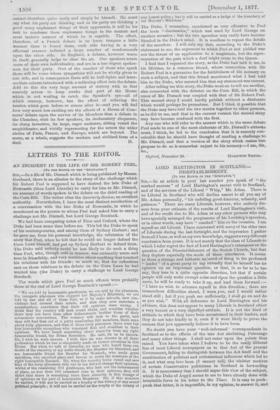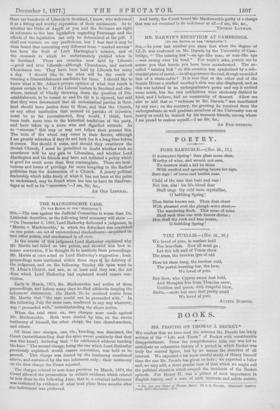LORD HARTINGTON IN SCOTLAND.— DISESTABLISHMENT.
[TO THE EDITOR OF THE uSPEOTATOR."1
Srn,—In an article in your last number you speak of "the. marked success" of Lord Hartington's recent visit to Scotland, and of the services of the Liberal "Whip," Mr. Adam. There hi, no Liberal in Scotland who will decline assent to all you say of Mr. Adam personally, "his unfailing good-humour, urbanity, and patience." There are many Liberals, however, who entirely dis- sent from your estimate of the results of Lord Hartington's visit,. and of the credit due to Mr. Adam or any other persons who may have specially arranged the programme of his Lordship's speeches,. or in other words, may have " coached " him on the occasion. I atn, myself an old Liberal. I have conversed with many of the older race of Liberals during the last fortnight, and the impression I gather from all I hear, as well as my own knowledge, suggest a very different conclusion from yours. It is not merely that the class of Liberals to which I refer regret the fact of Lord Hartington's utterances on the question of the Disestablislament of the Scotch Church, but that they deplore especially the mode of these utterknces. It seems to them a strange and hitherto ua;ieard-of thing in the professed+ " leader " of a great party to say virtually that he himself has no opinion on an important question, or that, in so far AEI he has. any, they lean in a quite opposite direction, but that if certain people will only make enough noise and ripen the question a little more, he will be ready to take it up, and lead them forward :— "I have no wish to advance myself in this direction ; there are difficulties ahead, I warn you, and I would rather stand still ; but if you push me sufficiently, I shall go on and do. as you wish." With all deference to Lord Harlington and his. advisers, this does not appear to many Liberals in Scotland either a very honest or a very dignified attitude. It is not the kind of attitude to which they have been accustomed in their leaders, and they do not take kindly to it, even if it were likely to prove the- success that you apparently believe it to have been.
No doubt you have your 4 well-informed ' correspondents in Scotland as to the effects of the late Act abolishing Patronage and many other things. I shall not enter upon the points thus raised. You have taken what I believe to be the really illiberal line of most Liberal newspapers as to that Act of the present Government, failing to distinguish between the Act itself and the combination of political and ecclesiastical influences which led to it, and what may have been (I cannot tell) the sinister motives of certain Conservative politicians in Scotland in forwarding it. It is unnecessary that I should argue this view of the subject, which the Duke of Argyll seems to me to have already done with inimitable force in his letter to the Times. It is easy to pooh- pooh that letter, it is impossible, in my opinion, to answer it, and there are hundreds of Liberals in Scotland, I know, who welcomed it as a fitting and worthy expression of their sentiments. As to whether the Duke of Argyll or you and the Scotsman are right in reference to the late legislation regarding Patronage and the effects of the legislation can only be determined at the poll. I hall not venture on any predictions, but I fear that it may be then found that something very different from "marked success" has been the fruit of Lord Hartington's mission, and of the counsels to which he unfortunately yielded when in in Scotland. There are counties now held by Liberals —good and true Liberals—although Churchmen, and earnest Churchmen too. They have been held by Liberals for many a day. 1 should like to see what will be the result of running a Disestablishment candidate for them. I should like to know what is Mr. Adam's private opinion of what that result is almost certain to be. If the Liberal leaders in Scotland and else- where, instead of blindly throwing down the question of Dis- establishment, to be tossed to and fro till it is ripened, had said that they were determined that all ecclesiastical parties in Scot- land should have justice done to them, and that the Church, 4:,r any other institution that seemed to partake of injustice, must be so far reconstructed, they would, I think, have been both more true to the historical traditions of the party, -and have taken up a more wise and dignified attitude. As to "success," this may or may not follow their present line. The turn of the wheel may come in their favour, although
am greatly mistaken if they do not look for it a long time before it comes. But should it come, and should they overthrow the Scotch Church, I must be permitted to doubt whether such an -overthrow will be any gain to Liberalism, and whether Lord Hartington and his friends may have not initiated a policy which is good for much more than they contemplate. There are insti- tutions and forms of privilege far more tempting to the Radical politician than the destruction of a Church. A jaunty political rleadership which talks freely of what it has not been at the pains to understand, may be found when too late to have its disadvan- tages as well as its "successes."-1 am, Sir, &e., AN OLD LIBRRAL.







































 Previous page
Previous page